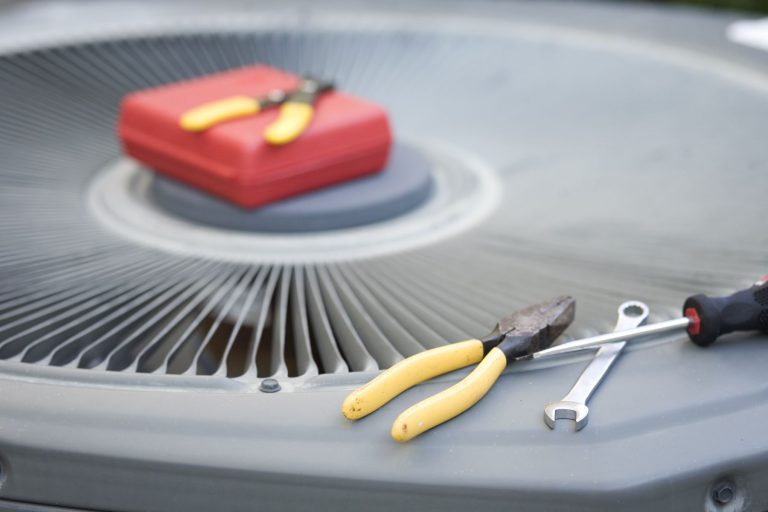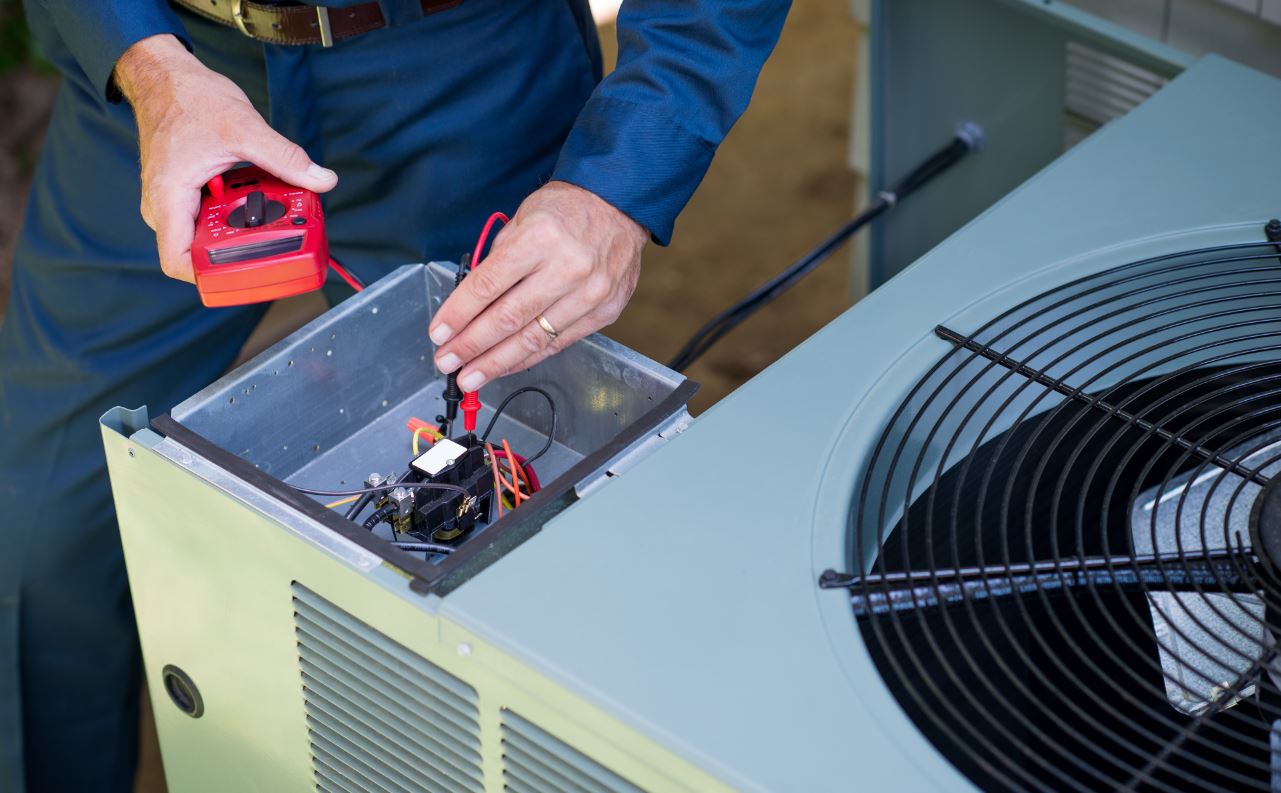
Heat Pumps: Your Questions Answered
What is a heat pump, and how does it differ from an air conditioner?
We have an awesome post that explains the difference between heat pumps and air conditioners in detail, but the gist is this:
An air conditioning system, like your fridge, absorbs heat from air that passes over the coil, and the resulting cool air is moved into your ducts and through your home. The collected heat is expelled through an exhaust process. The air conditioning unit attaches to, and works in tandem with your current heating source—usually a furnace.
A heat pump is an all-in-one unit that heats and cools your home. It works year-round to pull the heat from the outside air to heat your home, and reverses to pull heat out of your home to make it cooler. It is often installed as an add-on to an existing gas furnace. The heat pump and furnace never operate at the same time, but instead share the heating load. Whatever option is most cost-effective to operate will switch on. In very cold weather, the furnace will turn on, while more moderately cool temperatures will utilize the heat pump instead. Pretty cool, right?
Is a heat pump the best option for me?
A heat pump is generally a great heating and cooling option for PNW homes because of our moderate climate. The temperature hardly ever dips into the teens or twenties or skyrockets into the nineties or over one hundred, so the heat pump is able to operate at an efficient level.
If you notice your energy bills creeping up, a heat pump might be the way to go. Not only are the units energy-efficient, but they’re also powered by renewable electricity, making them a more environmentally friendly option over many other energy sources.
However, if you only need cooling and already have an efficient heating method such as a high-efficiency furnace, an air conditioner might be a more economical option. A Home Energy Specialist will be able to inspect your current heating and/or cooling system to recommend the right product for your unique situation and budget.
What heat pump brand do you recommend?
We’re all about Bryant. Here’s why:
- Selection: There’s a heat pump for every home and budget
- Reliability: Bryant products are built for longevity, especially when paired with ongoing tune-ups and maintenance
- Energy efficiency: SEER ratings from 15.3-20
- Expertise: Bryant has been in the heating and cooling industry for a century
- Warranty: Because they use only the highest quality components in their heat pumps, Bryant offers a 10-year warranty on parts
Washington Energy Services only installs products from the industries’ top manufacturers, and heat pumps are no exception. You can rest assured that the Bryant heat pumps that we install in our customers’ homes are the same ones we install in our own homes.
How much do heat pumps cost?
Cost depends on several factors, including the size of your home and your current duct work. So while we can’t tell you here exactly what your cost will be, one of our Home Energy Specialists can during a free, in-home, no-pressure consultation. Schedule one here!
Do you have more heat pump questions? We hope so! Leave your questions in the comments or contact us.
- 2016
- AC
- AC Installation
- AC Units
- AFUE
- air conditioing
- air conditioner
- air conditioning
- air conditioning maintenance
- air conditioning service
- air conditioning tune-up
- air duct
- air duct cleaning
- air handlers
- air pollution
- Air Purification System
- air purifier
- Air Sealing
- angie's list
- award
- basement Finishing
- Bathroom remodel
- BBB
- BBB Accredited Business
- before and after
- Best air conditioner
- best filters
- best generator
- best locks
- best water heater
- best window install
- boilers
- bryant
- Bryant AC
- bryant furnace
- bryant heat pump
- christmas lights
- clean air
- clothes drive
- Clothes For Kids
- coat drive
- combi-boiler
- comfort
- community
- Construction
- contractor
- contractors
- Cooling
- Cooling equipment
- Coronavirus Protection
- custom
- daikin
- deals
- discounts
- DIY
- Donation
- Donations
- door hardware
- door installation
- door replacement
- Door Transformations
- doors
- drafty home
- drain cleaning
- Duct Cleaning
- Duct Cleaning Services
- ductless
- Ductless heat pump
- ductless heat pump. mini-split
- Ductless heat pumps
- ductless heating system
- ductless heating systems
- ductless installation
- Ducts
- earth day
- eco friendly
- EER
- election
- electrical inspection
- emergency
- energy
- energy conservation
- energy efficiency
- energy efficiency rebates
- energy efficient AC
- energy efficient air conditioner
- energy efficient home
- energy efficient hvac
- energy efficient HVAC Systems
- energy efficient windows
- energy myths
- energy saving
- energy saving home products
- energy star
- energy tax credit
- environmentally friendly
- exterior doors
- fall
- fall weather
- fiber cement
- fiberglass doors
- filter
- filter change
- financing options
- fireplace
- fireplace insert
- fireplace repair
- fireplace tune-up
- front door
- furnace
- furnace filters
- furnace install
- furnace maintenance
- furnace mileage
- furnace problems
- furnace replacement
- furnace service
- furnaces
- Garage door replacement
- gas fireplace
- gas fireplace inserts
- Gas Fireplace Makeover
- gas furnace
- generators
- going green
- good business practices
- green solutions
- Guardian Maintenance Club
- heat
- heat pump
- heat pump installation
- heat pump maintenance
- heat pump vs ac
- Heat Pumps
- heat pumps maintenance
- heat wave
- Heating
- Heating and Cooling equipment
- heating and cooling systems
- Heating Brands
- Heating Control
- Heating equipment
- Heating System Tuneup
- heatwave
- HEPA filter
- history
- holiday
- home
- home buyer
- home energy
- home energy efficiency
- Home energy efficiency solutions
- home exterior
- home heating
- home improvement
- Home Improvement Rebates
- home improvement repair
- home inspection
- home maintenance
- home maintenance checklist
- home maintence
- home performance
- home protection
- home repair
- home safety
- home upgrade trends
- home upgrades
- home value
- homeowners
- honeywell
- hot water
- hot water heater
- houzz
- how to
- HVAC
- HVAC Contractor
- HVAC Contractors
- hvac system
- IAQ
- indoor air quality
- infographic
- install
- install furnace
- insulation
- intellihot
- interior doors
- kids
- Kitchen face lift
- LED light
- LED lights
- light bulb
- light bulbs
- locks
- mailbag
- maintenance
- march
- membership
- mini-split
- modulating furnace
- money saving
- money savings
- navien
- new door installation
- new home
- New homeowner
- new windows
- news
- pacific northwest weather
- patio doors
- pets
- plumbing
- plumbing inspection
- power
- power outages
- precision tune up
- preventative
- Pro Tips
- Programmable Thermostat
- Programmable Thermostats
- propane
- PSE Award
- PSE Energy
- PUD
- Q & A
- Ratings
- rebates
- refund
- REME Halo
- Remodel
- remodeling hacks
- Replacing Heating System
- reputation
- Safe Home Insulation
- sale
- save energy
- Saving money
- scam
- scams
- seattle
- Seattle Weather
- SEER
- service
- services
- Siding
- Siding replacement
- sliding glass doors
- Smart Home
- Smart thermostat
- smoke
- Solar Attic Fan
- solar power
- Solar Powered Light Strand
- sound
- spring
- standby generators
- storm doors
- summer
- summer fires
- Summer heat
- Summer home
- super service 2016
- tank water heater
- Tank water heaters
- tankless tune ups
- tankless water heater
- tankless water heaters
- tax rebate
- thanksgiving
- Thermostat
- tips
- trends
- tune-up
- upgrade
- upgrade cooling
- upgrade heating
- utilities
- utility rebates
- veterans
- Washington Energy
- washington energy services
- water conservation
- Water Heater
- water heater installation
- water heater maintenance
- water heater repair
- water heaters
- water leak protection
- Wildfire Season
- wildfire smoke
- window
- window energy efficiency
- window install
- window maintence
- window remodel
- window repair
- window replacement
- windows
- winner
- winter
- zone heating
- Air Conditioning
- Air Purifiers
- Cooling
- Doors
- Ductless heat pump
- Environmental
- Fireplace
- Furnace
- Gas fireplace
- Generators
- Heat pump
- Heating
- Home improvement
- How to
- HVAC
- Indoor Air Quality
- Insulation
- News
- Plumbing
- Rebates
- Seattle
- Siding
- Smart Home
- Tank water heaters
- Tankless water heaters
- Tips to save money
- Uncategorized
- Wildfire Season
- Windows
